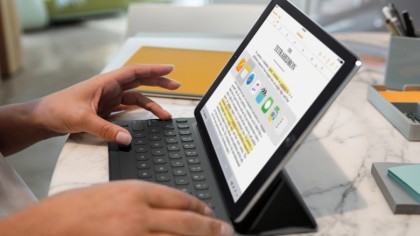Can you run your business with a tablet like the iPad Pro?
Could SMBs wave goodbye to laptops in favour of Apple's new tablet?
Making a decision
As a small business owner the investments you make must have a strong business case. The wholesale adoption of the iPad or other tablets may have already begun thanks to BYOD (Bring Your Own Device). However, where you intend to make a more formal adoption of these technologies, bear the following points in mind…
Think about connectivity
Do you need the ports that a traditional laptop offers? If you use USB or HDMI ports regularly, connecting an iPad to external devices such as projectors could be frustrating.
Using business applications
The Microsoft Office suite has of course been available for some time on iOS. If you spend your days with these applications, using the touchscreen and pencil with these apps does need some getting used to.
Choose your keyboard
One of the key advantages of the iPad Pro is that you can choose to use the virtual on-screen keyboard, or connect a physical keyboard to the tablet. The Apple keyboard doesn't have the key travel of a laptop, but you can of course connect a number of third-party keyboards.
Battery life
Apple claims a ten-hour battery life, but in the real world this is more realistically around seven to eight hours. This of course depends massively on what you are doing with the iPad.
Screen performance
The 12-inch iPad sports a screen resolution of 2732 x 2048. The 9.7-inch version is 2048 x 1536. The 12-inch Surface Pro 4 sports a screen with a resolution of 2736 x 1824. It's the form factor of the iPad, coupled with its always-on and available nature that makes the tablet so compelling to use.
Storage capacity
Whether the storage capacity of today's laptops and tablets is a concern largely depends on how you will be using the device. On-board storage for the new iPad Pro is a maximum of 256GB. The Surface Pro 4 can have up to 512GB on its SSD. Many business users of course will store documents in the cloud, and use a core set of apps, making what appears to be a lack of storage on the iPad not such an issue.
Sign up to the TechRadar Pro newsletter to get all the top news, opinion, features and guidance your business needs to succeed!

Different operating systems
There is no escaping the fact that the operating system that the iPad Pro uses isn't a fully-featured desktop OS. The compromises that have to be made in order to deliver the iPad Pro in its current form to support the idea of mobile media for consumers means the device can't offer a desktop OS environment.
Xero's Oliver Furniss concluded: "It's mostly larger businesses that adopt tech for tech's sake. There will always be those trying to persuade SMEs of how technology X, Y or Z can transform their business, but most SMEs are both too smart and too conscious of cash flow to buy into the latest thing on a whim."
He continued: "For other SMEs there might not be clear business reasons to adopt such technologies yet, but they're becoming more pervasive all the time. Such businesses should keep an eye on what others in their industry are using. If your fellow small business owners are switching to iPads and apps, there will be good reason for it and you should find out why that's working for them."
No one – except perhaps Apple – is claiming that the business laptop is dead. What is certain is that the easy decisions your business has made in the past regarding the replacement of these devices are no longer clear cut. The new Apple iPad Pro and its brethren now offer a tangible alternative that many small businesses in particular will adopt and exploit.
- Find out where the iPad Pro ranks in our top 9 business tablets round-up